Documentation, Upgrades, Enhancements
Documentation
What documentation is available for Alma? How can it be accessed?
All software documentation is located on the Ex Libris Knowledge Center ( http://knowledge.exlibrisgroup.com/) available without any need for registration or authentication. All documentation is thorough, with many screenshots and step by step examples. Alma documentation is also available from directly within the application, from where it may also be downloaded and reproduced. Alma includes context sensitive online help screens, as well as What’s New videos following each monthly Alma release, and a step-by-step “Show Me How” function for specific areas of functionality in Alma. Documentation is updated with each Alma release, as appropriate.
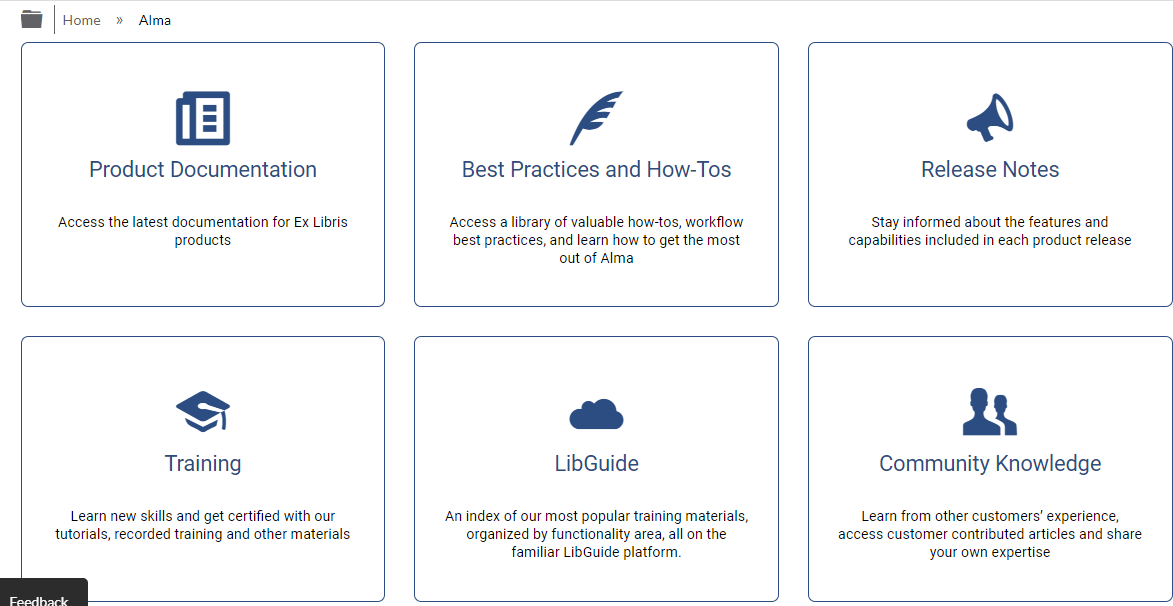
When requesting assistance with a question or problem, the Knowledge Center is a portal that organizes information into three types of articles:
-
How-To
-
Solutions
-
Questions and Answers
Knowledge Center articles are designed to be short and to the point, with clear, comprehensive, and easy to understand answers. Article content is reviewed and updated regularly by certified Ex Libris Knowledge Center support analysts, based on new experiences and information. Article scope will improve constantly as Ex Libris adds and updates articles with customer collaboration.
Every time a customer submits a new Case, the Salesforce system automatically provides a list of relevant articles based on the Case Title. From this list, the customer can:
-
Filter the list by product to locate more relevant articles;
-
Modify search terms to locate more relevant articles;
-
Link his or her case to an article that provides a solution to the issue or to the question, enabling the customer to close the case on their own; and
-
Link the case to an article related to the issue or question to help resolve the problem.
Additionally, the Ex Libris Developer Network consists of dedicated sections for each Ex Libris product, and includes:
-
API Docs: Comprehensive API and integration documentation and technical guides
-
Codes and Apps: an advanced portal for sharing, experimenting, and managing the lifecycle of developments, hosted on GitHub
-
Tech Blog: Advice, technical guidance, and best practice information offered by developers and Ex Libris development team members
-
API Console: a testing environment (sandbox) in which users will be able to experiment with Ex Libris APIs before implementing them in their solutions.
-
Forums: Online forums in which developers can share ideas, questions, and answers about how to get the most value from Ex Libris APIs
-
API Dashboard: A tool enabling developers to manage their implementations of open interfaces and view usage analytics.
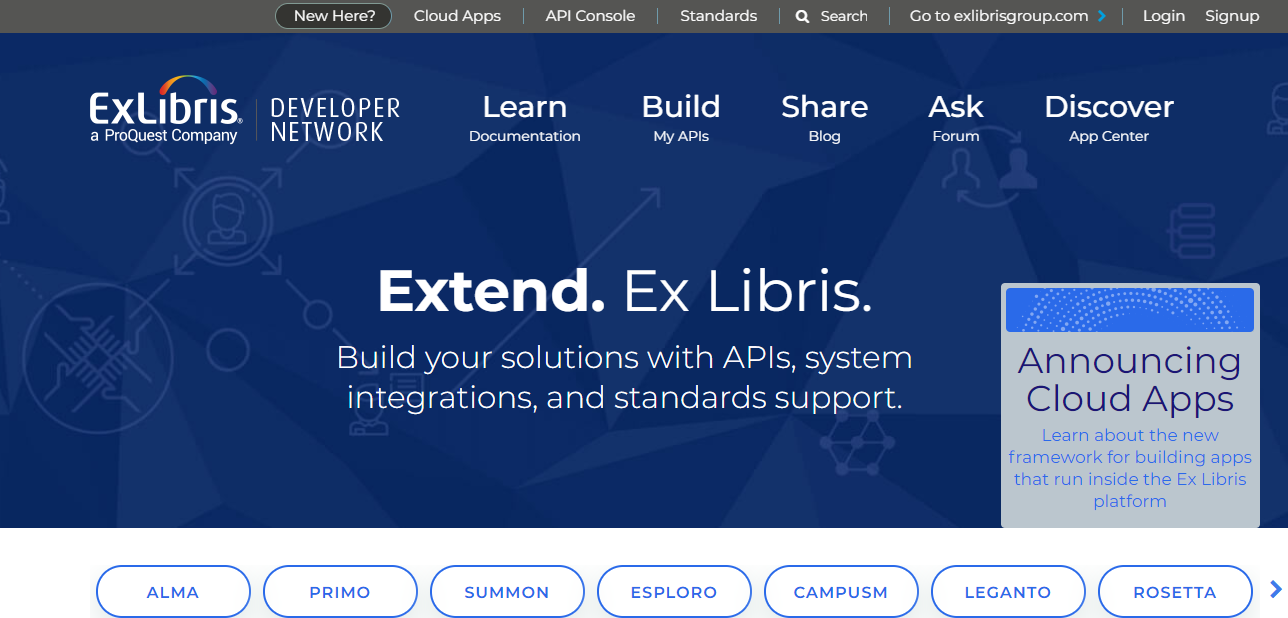
Upgrades, source code control
How often is Alma upgraded?
In true software-as-a-service solutions, the concept of product versions and platform upgrades is very different from that of legacy systems. Particularly in the case of Alma, there are no “upgrades” or “patches”; instead, new releases are deployed on the first Sunday of every month. Two weeks prior to the monthly release date – i.e., the second last Sunday of the previous month – we deploy the new release in all the sandbox environments, allowing customers to test and familiarize themselves with the features.
Monthly Release Notes are published with every new release, as well as ‘How-to’ videos and interactive guides to assist users in getting familiar with new features.
All of the Alma software updates are done centrally and for all Alma customers at once, so that all customers are always using the latest version (just as a user will always be on the latest version of Gmail). Since Alma runs in the Ex Libris cloud, all of the solution’s platform-related tasks are handled by Ex Libris cloud services personnel.
In addition, Alma may require ongoing maintenance performed by our SaaS team, such as hardware replacement, security patches, and practice of failover scenarios. The maintenance window for release deployment and other routine maintenance work falls between Saturday 8:00 PM and Sunday 6:00 AM, U.S. Central time. During this time, the system may be unavailable for short periods of time. Announcements to customers are sent seven days in advance.
What is the Alma release methodolgy?
Each software update being released goes through internal QA processes.
Nevertheless, the actual deployment of the software update is done gradually.
Each new release is fully tested in a cloud testing environment using a complete set of data. Once this cloud environment test has been passed, Alma will be installed in the sandboxes environments.
Customers are able to test new functionality on the sandbox environment and report back any issue or bug found to Ex Libris to be fixed before the release is implemented in the live environments. The standard sandbox that includes Ex Libris provided standard data and configuration is included in the Alma subscription fee and provided for every customer.

In addition, each customer can choose to have a premium sandbox that will hold a full replication of the customer's data. Related activities that are done on this environment may be configuration changes, testing of new processes or training.
What tools are in place for source code control?
Ex Libris products follows the Agile System Development Life Cycle (SDLC). This allows Ex Libris to deliver monthly releases and to respond quickly to customer needs in a multi-tenancy cloud-based SaaS environment, including security. Secure coding practices and security awareness are an integral part of the SDLC process.
As part of the Ex Libris development life cycle policy and process, audits are performed by the team leader or the code author. Tests of the code review are done by the Security Officer who performs a security review and vulnerability assessment at least on quarterly basis, in addition to an annual application penetration test that verifies that security measures are in place.
How many software releases are there on an annual basis?
As a SaaS solution, Alma is enhanced with frequent, small software updates. Two types of updates are deployed during scheduled maintenance windows:
Monthly releases: Includes new features and bug fixes and take place typically on the first Sunday of each month (exact schedule is published in advance). The release to the Sandbox takes place two weeks before the release to the production environment, giving users times to test new features.
Hot Fixes: deployed typically on the second Sunday of the month to address critical/high bugs.
An example of the release plan for 2020/2021:
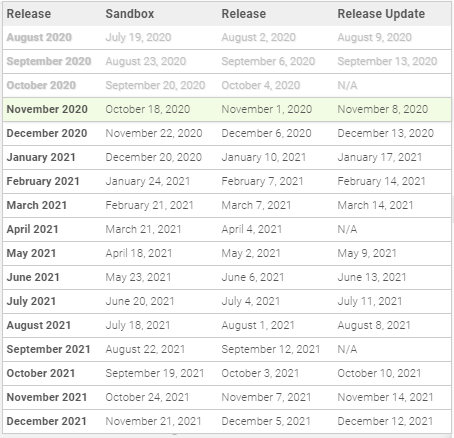
An example of notification on the Alma dashboard of an upcoming service pack:

Can the customer choose what to implement when there is a new upgrade?
As far as possible Ex Libris aims in the monthly Alma releases to make new features and functionality ‘opt-in’ so that the institution does not need to implement new functionality unless and until it wishes to.
How are developments and upgrades co-ordinated?
All new developments are fully tested by our QA team – including regression testing.
Alma's agile methodology for development where discreet developments items are created in monthly sprints lessens the likelihood of new functionality impacting on existing functionality.
QA is conducted as part of the sprints as an ongoing process. This is achieved by the QA staff working together with the development team, testing as early as possible during the sprints.
In addition, automatic sanity testing is performed on a weekly basis to ensure that the system is stable during the sprint.
How are upcoming changes to Alma communicated to the customer?
All software documentation is located in the Ex Libris Knowledge Center (http://knowledge.exlibrisgroup.com/) available without any need for registration or authentication. All documentation is thorough, with many screenshots and step by step examples. Alma documentation is also available from directly within the application, from where it may also be downloaded and reproduced.
Alma includes context-sensitive online help screens, as well as What’s New videos following each monthly Alma release, and a step-by-step “Show Me How” function for specific areas of functionality in Alma. Documentation is updated with each Alma release, as appropriate.
Enhancements
How are requests for enhancements handled?
- Ideas Exchange platform (http://ideas.exlibrisgroup.com/): Idea Exchange is a website that allows for the exchange of ideas and facilitates communication directly between the users and the Ex Libris product management teams. The Ex Libris Idea Exchange website is completely open, enabling anyone who uses our solutions to submit and review ideas. Such ideas are an invaluable source for helping us understand your needs and priorities. The Ex Libris Idea Exchange is open for submitting ideas for Alma, Primo, Rosetta, campusM, Summon and Leganto.
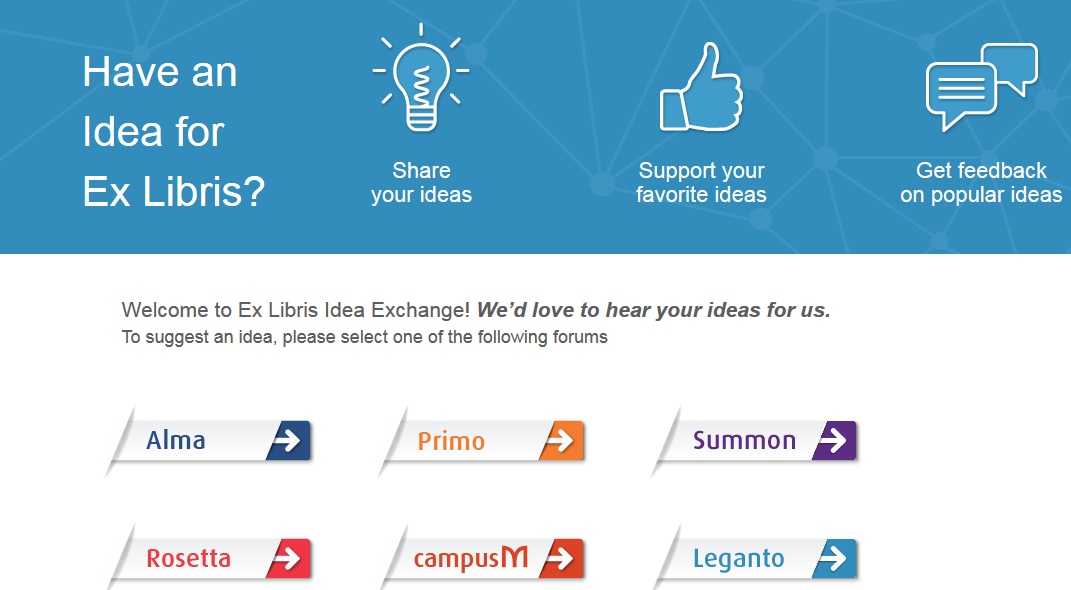
- ELUNA and IGeLU: ELUNA has defined a product enhancement process. Most Ex Libris products have their own Product Group within ELUNA, whose leaders are responsible for organizing the enhancement process, and communicating with Ex Libris product managers, their ELUNA counterparts, and users of the product. Members identify and provide feedback on suggested enhancements, and work with Ex Libris on future developments and strategic goals. Only member institutions have the opportunity to vote on enhancements.
What role do customers play in the product enhancement process?
ELUNA, (the Ex Libris Users of North America) and IGeLU (The International Group of Ex Libris Users) have a defined product enhancement process. Most Ex Libris products have their own Product Group within these groups, whose leaders are responsible for organizing the enhancement process, and communicating with Ex Libris product managers, the groups' counterparts, and users of the product.
Members identify and provide feedback on suggested enhancements utilizing NERS the "New Enhancement Request System", and work with Ex Libris on future developments and strategic goals. Only member institutions have the opportunity to vote on enhancements.
For example, enhancements requested by customers that Ex Libris has committed to providing include greater Alma-Primo integration, virtual browse display, context-sensitive autocomplete, integration with course management systems, and the display of images (similar to the Google image search).
Some enhancements we have developed or are in the process of developing as the result of customer feedback include:
- Shared configuration in the Network Zone: Resource Sharing definitions, Vendors, Fulfillment Policies/Terms of Use
- Enhancing overdue/lost loan notifications so that it will be possible to create multiple notifications at varying intervals
- ASRS/Dematic Integration
- Incremental enhancements related to consortial resource sharing
Additionally, Idea Exchange (http://ideas.exlibrisgroup.com/) is a website that allows for the exchange of ideas and facilitates communication directly between the users and the Ex Libris product management teams.
The Ex Libris Idea Exchange website is completely open, enabling anyone who uses our solutions to submit and review ideas. Such ideas are an invaluable source for helping us understand your needs and priorities. The Ex Libris Idea Exchange is open for submitting ideas for Alma, Primo, Rosetta, campusM, Summon and Leganto.
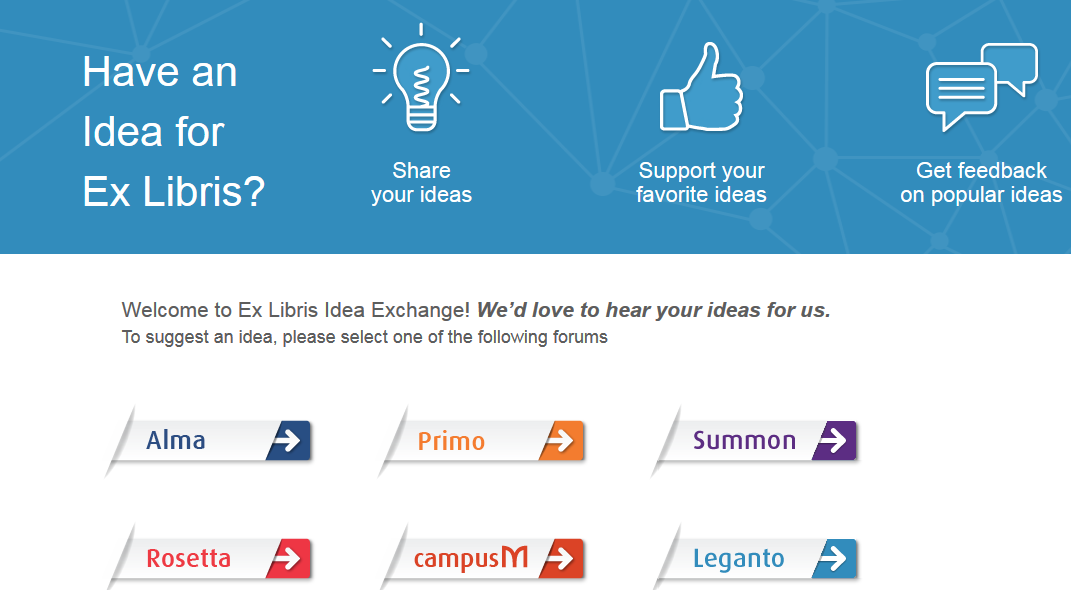
Some enhancements that we have already committed to that have been suggested through the Alma Idea Exchange include (but are not limited to) the following:
- "View Inventory" from the Holdings Record
- Allow multiple item records to be withdrawn at the same time.
- Staff search: add thumbnail to staff search results
- Ability to add more than one POL to an electronic collection
- Add the ability to move item record(s) from one bib record to another.
For more information, please visit http://ideas.exlibrisgroup.com/.
How are votes allocated for enhancement requests?
IGeLU, ELUNA, and Ex Libris have a Product Development Collaboration Agreement, where Ex Libris has a commitment to develop the top voted enhancement requests from customers.
The NERS system and underlying Product Development Collaboration Agreement give ELUNA and IGeLU members the benefit to prioritize customer enhancement requests using the voting system in NERS.
Ex Libris allocates periodically a specific amount of development resources to each product and the top voted enhancements of the NERS voting will be implemented each year.
IGeLU and ELUNA member institutions get one vote per institution according to their enhancement agreement with Ex Libris, regardless of an institution’s membership in one or both user groups.
The only exception is where consortia have a vote and consortia members also choose to have individual memberships, which entitles them to get a direct vote as well.
The only exception is where consortia have a vote and consortia members also choose to have individual memberships, which entitles them to get a direct vote as well.
How is it decided if a problem is an enhancement request or a bug fix?
Comments or questions raised by customers are first analyzed by the support contact. When in doubt whether the system behavior is as designed and expected or not, the support contact uses a standard consultancy procedure with the Product Management in order to identify whether the issue is a defect or an enhancement request. In case of an enhancement request, the customer is referred to the standard enhancement request procedures.
On average how quickly are bug fixes made?
Bugs are dealt with according to their severity. By nature, critical bugs are treated with higher response time as oppose to lower severity bugs.
Every monthly release includes bugs fixes that are listed in a dedicated document that Ex Libris publishes.
Our SLA defines the response time we commit to according to the severity of the issue that is reported.
What is the user community involvement in the development of the KnowledgeBase?
Total views:
3676
